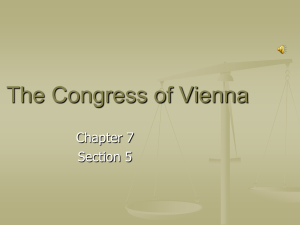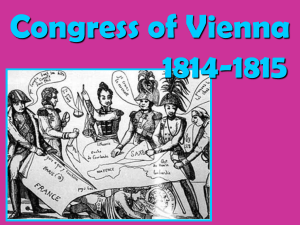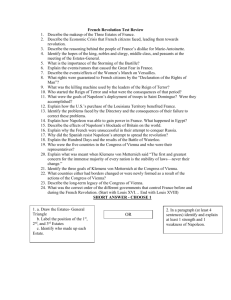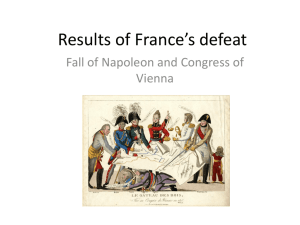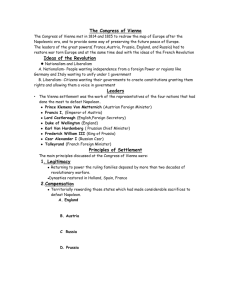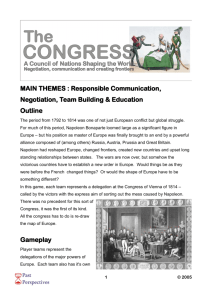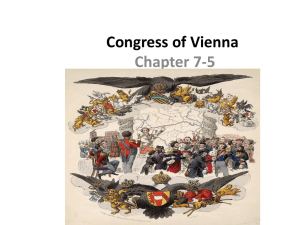The Congress of Vienna: 1814-1815 - Course
advertisement
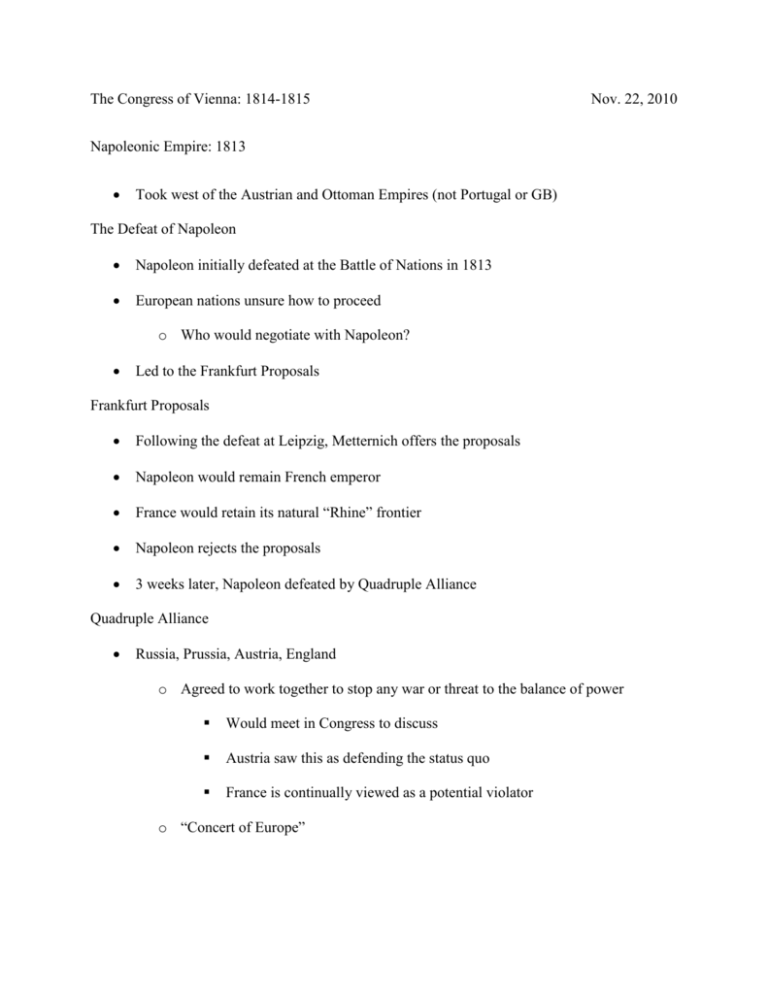
The Congress of Vienna: 1814-1815 Nov. 22, 2010 Napoleonic Empire: 1813 Took west of the Austrian and Ottoman Empires (not Portugal or GB) The Defeat of Napoleon Napoleon initially defeated at the Battle of Nations in 1813 European nations unsure how to proceed o Who would negotiate with Napoleon? Led to the Frankfurt Proposals Frankfurt Proposals Following the defeat at Leipzig, Metternich offers the proposals Napoleon would remain French emperor France would retain its natural “Rhine” frontier Napoleon rejects the proposals 3 weeks later, Napoleon defeated by Quadruple Alliance Quadruple Alliance Russia, Prussia, Austria, England o Agreed to work together to stop any war or threat to the balance of power Would meet in Congress to discuss Austria saw this as defending the status quo France is continually viewed as a potential violator o “Concert of Europe” Abdication of Napoleon As a part of the Treaty of Paris, 1814 o Napoleon abdicated throne o Exiled to Elba o Bourbon Restoration Louis XVIII o Congress of Vienna meets for first time in Sept. 1814 The Congress of Vienna Napoleon escapes Elba and begins his 100 days of rule o Defeated by Quadruple Alliance Congress of Vienna continues to meet informally and concludes 9 days prior to Napoleon’s final defeat at Waterloo The Congress System Congress of Vienna was first in a series called the Congress System o Diplomats wanted to preserve peace o “Gentleman’s Agreement” Verbal, no constitution o Where conflict could lead to war – meeting to discuss resolution o Early origins of international cooperation 1815-Congress of Vienna 1818-Congress of Aix-la-Chapelle (where France was included) 1820-Congress of Troppau 1821-Congress of Laibach 1822-Congress of Verona The Dancing Congress Pageantry, parties, balls o Banquets like pre 1789 Meant to generate good will between delegates o Occupy their time since there was often no serious nature of work going on The Congress of Vienna: Goals and Accomplishment The Goal of the Congress of Vienna Draw an acceptable peace agreement in Europe o No great rewards o No great punishments o Redraw the map of Europe as it existed pre-1789 in order to ensure peace & stability Status quo ante bellum Leaders at the congress agreed to a balance of power in Europe o Ensuring that no country could dominate the continent, politically & militarily as France had done Overall Accomplishments of the Congress Balanced settlement which ensured no major conflict for 40 years and then until 1914 o Crimean War: 1854-1856 Included France o Kind to France, so as not to lead to feelings of revenge Ignored demands for greater democracy and nationalism o Led to many issues in the 1800’s between & within countries Desire to restore monarchies o Principle of Legitimacy Principle of Legitimacy Restore power to monarchs Return to power to ruling families deposed after two decades of revolution o Bourbons in France, Spain and Naples o Dynasties in Holland o Papal States returned to the Pope The German States German Confederacy was set up to replace the HRE German states reduced from over 300 to 39 Bicameral Diet established with delegates, presided by Austria Each state retained independence, was forbidden between states Consent of Confederacy necessary for foreign war Condemnation of the Slave Trade In Feb. 1815 the Congress condemned the slave trade Inconsistent with civilization & human rights The Delegates at the Congress Prince Klemens von Metternich: Objectives (Austria) Restore Europe to pre-French Revolution Dominated Congress Rejected ideas of French Revolution Conservative, resisted change o Despised democracy & nationalism 1815-1848 o Anti-democratic policies followed throughout W. Europe Lord Castlereagh: Objectives (England) To ensure France would never again become a dominant power in Europe o Determined to diminish the prestige and influence of France o Encircle France with larger and stronger states guaranteeing a balance of power Czar Alexander I: Objectives (Russia) To organize an alliance system (Holy Alliance) of Christian monarchs to fight revolutions throughout the world o Ineffective, idealistic, existed only on paper o Britain & Pope didn’t join Wanted a free and independent Poland o With himself as King of Poland o Gave him part of Poland Charles Maurice de Talleyrand: Objectives (France) Wanted to ensure that France would retain the rank of a major power in Europe Plays the role of mediator between Prussia/Russia and England/Austria Divide and Conquer-divided enemies and used it against them Allies with England and Austria Treachery of Talleyrand 1808-1809 o Talleyrand secretly in touch with Alexander I o What would happen after Napoleon’s overthrow o Metternich’s famous comment “A lump of shit in a silk stocking” “Vous estes de la merde dans un bas de soie” Karl von Hardenber: Objectives (Prussia) Wanted to recover Prussian territory that was lost to Napoleon in 1807 Wanted additional territory in Northern Germany (Saxony) Metternich’s puppet Wanted to pull France apart (but that’s ok Audrey…there’s no need) Who Got What? Compensation rewarded to states who made considerable sacrifices to defeat Napoleon England o Naval bases Malta, Ceylon, Cape of Good Hope Austria o Lombardy, Venetia, Galicia, Illyrian Province (Adriatic Sea) Russia o Most of Poland, Finland o Alexander I became constitutional monarch of Poland (still autocratic czar of Russia) Prussia o The Rhineland, part of Poland Sweden o Norway Netherland strengthened o Belgium to Netherlands o Northern border of France Prussia gets Rhenish land o Eastern border of France Switzerland guaranteed neutrality o Southeastern border of France German Confederation o Eastern border of France Sardinia adds Genoa o Southern border of France France keeps their land Congress of Vienna: Comments The confederation of German states & re-division of Italy led to 19th c. unification activity Britain appeared to gain little o But gained colonial powers, commerce Became the major European colonial power Liberalism/Nationalism halted, albeit briefly Russia enters as a West European power from 1815 onwards o Plays an important role in European diplomacy Caused World War I

